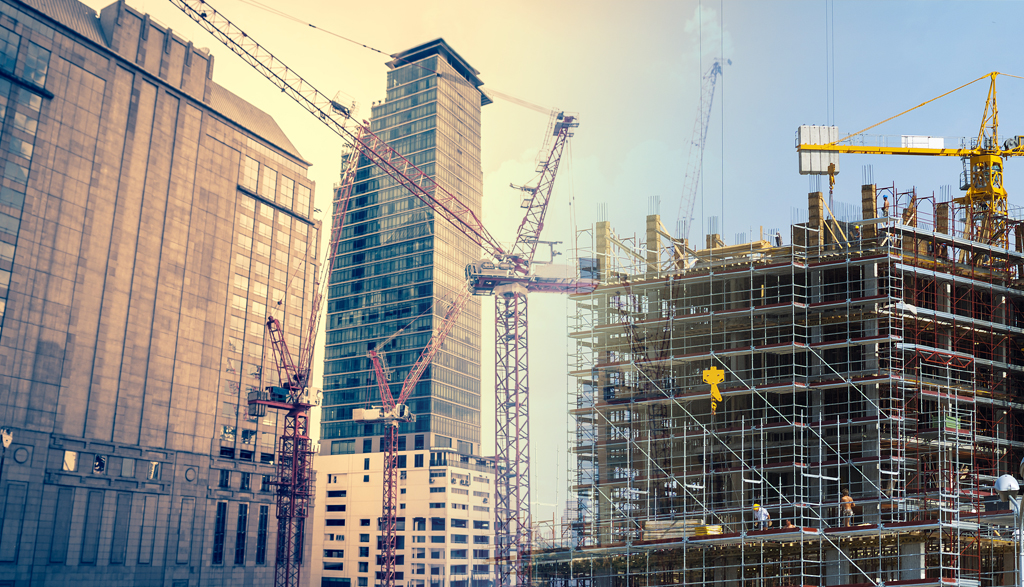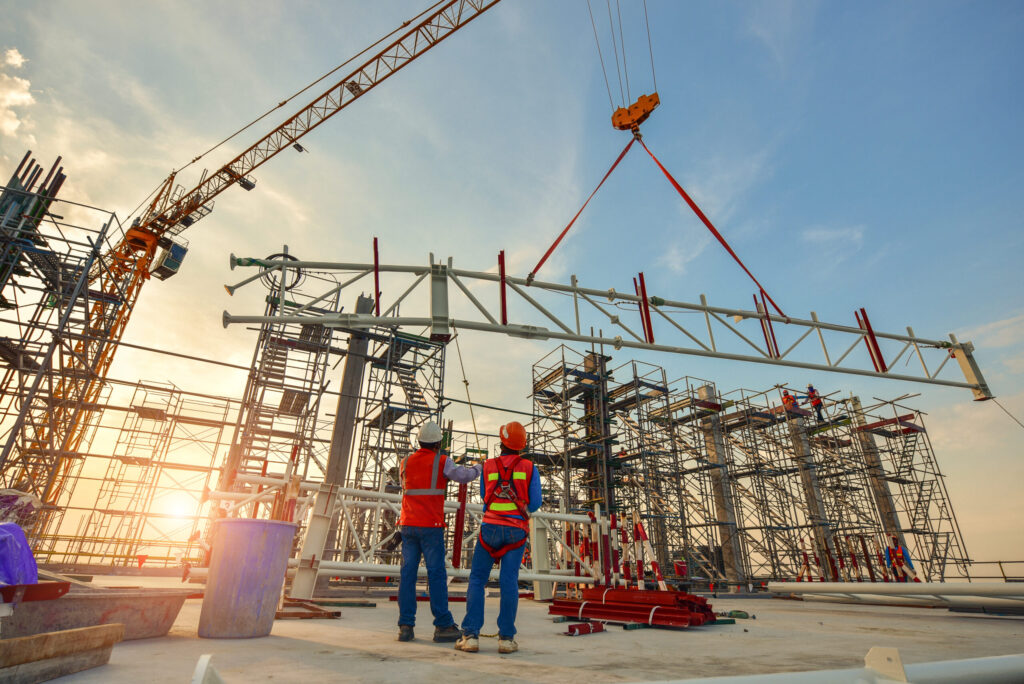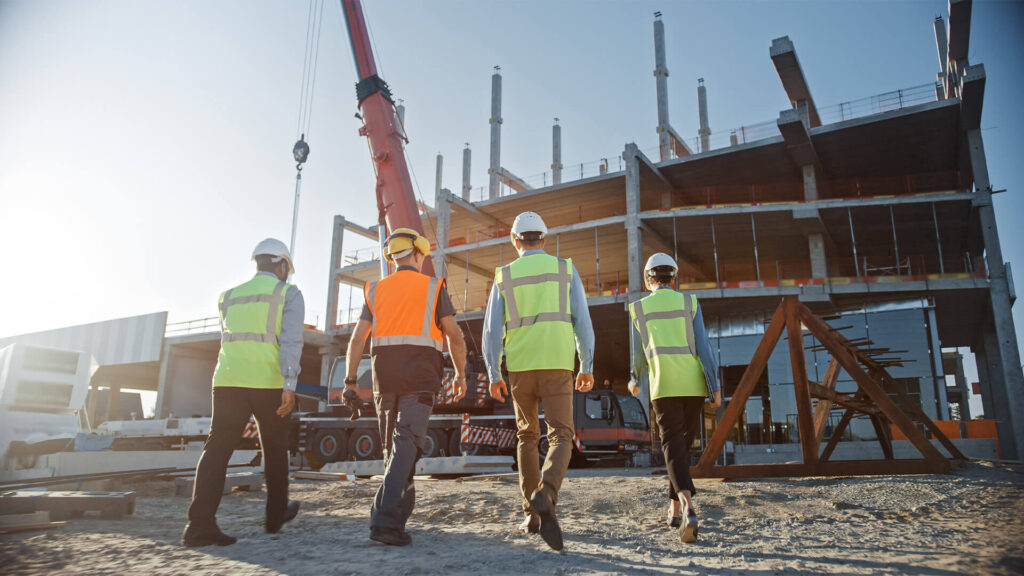
When undertaking a commercial construction project with a commercial contractor, often referred to as a building contractor, businesses often face numerous questions about the process. From pre-construction planning to budget management and risk mitigation, understanding the key elements of commercial development is crucial to ensure the project runs smoothly.
Whether constructing office buildings, manufacturing plants, industrial facilities, or other commercial structures, working with experienced construction professionals, project managers, and a reliable general contractor is essential for successful completion.
This article will address common concerns, such as managing construction timelines, project costs, risk management, and adhering to environmental regulations, to help businesses achieve a successful project outcome.
Introduction to the Industry
The commercial construction industry is a vital sector that involves the construction of commercial buildings, such as office buildings, retail spaces, and industrial facilities. These projects require meticulous planning, execution, and management to ensure successful completion. Adhering to local building codes, regulations, and standards is essential for compliance and safety.
Commercial construction companies play a crucial role in this industry, providing comprehensive construction services and managing projects from start to finish. Choosing the right commercial construction company can significantly impact the success of a project, ensuring it is completed on time, within budget, and to the required quality standards.
Many commercial construction companies specialize in specific types of projects, such as commercial development, pre-construction planning, and construction management.
To streamline processes, monitor costs, and ensure that projects run smoothly, project management software is often utilized. Experienced construction professionals, including project managers, engineers, and architects, are essential for the successful execution of commercial construction projects. Their expertise ensures that every aspect of the project is handled with precision and care, leading to a successful outcome.
Importance of Addressing Common Questions to Simplify Decisions
Addressing common questions early in the planning and construction phases is vital to streamline decision-making and ensure project success. Establishing clear project goals during the planning phase is essential for coordinating efforts among contractors and ensuring the successful execution of the project. By providing clear answers and solutions to concerns such as budget allocation, scheduling conflicts, and compliance with regulations, businesses can avoid unnecessary delays and unexpected challenges.
Open communication between stakeholders, contractors, and project managers helps to establish a cohesive strategy that includes safety protocols and fosters confidence throughout the process. Proactively addressing these questions not only saves time but also minimizes the risks of costly errors, contributing to a smoother, more efficient development experience.
How Long Does a Commercial Construction Project Take?

The timeline for a commercial construction project can vary greatly depending on several key factors, including accurate cost estimates. Understanding these influences is essential for project planning and execution, ensuring that the project timeline is met without unnecessary delays.
Factors Influencing Project Timelines
Size of the Project: Larger projects, such as skyscrapers or expansive warehouses, naturally take longer to complete compared to smaller buildings like retail stores or office spaces.
Complexity: The design elements, infrastructure requirements, and architectural details all play a role in determining the project duration. Advanced features like smart systems or sustainable building technologies can increase construction time.
Regulations and Permitting: Adhering to local building codes, zoning laws, and obtaining permits can introduce additional steps to the process, particularly in areas with stricter regulations. Delays in approvals can significantly impact timelines.
Effective resource allocation is crucial for managing timelines and budgets in commercial construction projects, ensuring timely completion and cost control.
Typical Timelines for Different Types of Commercial Construction
Small-Scale Retail Stores: Typically range from four to six months.
Medium-Sized Office Buildings: Commonly take 12 to 18 months.
Large-Scale Projects (e.g., hospitals, malls): The timeline for a commercial building can vary greatly depending on the project’s scope and complexity. Construction can last anywhere from two to five years, depending on scope and complexity.
What are the Key Phases of a Commercial Construction Project?
Effective execution of a commercial project requires a clear understanding of its key phases. Each phase plays a critical role in ensuring the project’s success, with stakeholders contributing actively throughout.
Here are the primary phases, their details, and the significance of communication and planning at every stage:
1. Planning Phase
The planning phase is the foundation of any construction project. During this stage, it is crucial to develop detailed construction plans to address unique challenges and facilitate compliance with regulations. The project’s scope, goals, timeline, and budget are established. Feasibility studies and market analyses are conducted to ensure the project aligns with financial and operational expectations.
Stakeholders, including the project owner, financial backers, and key consultants, collaborate to define needs and outcomes. Strong communication during this phase is vital to set realistic expectations and identify potential risks early.
2. Design Phase
The design phase converts initial plans into detailed architectural and engineering blueprints. Architects, engineers, and designers work closely to create functional, aesthetically pleasing, and regulations-compliant designs. This phase often includes schematic design, design development, and final construction documentation.
It is crucial to prepare the necessary documentation to ensure compliance with building regulations and avoid potential penalties.
Stakeholders, such as the project owner and design team, must maintain ongoing dialogue to ensure the designs meet both practical and budgetary requirements. Thorough planning here prevents costly changes during later stages.
3. Permitting Phase
Before construction begins, proper permits and approvals must be obtained from local authorities and regulatory bodies. This process ensures compliance with zoning laws, environmental regulations, and safety codes.
Stakeholders, particularly project managers and legal consultants, oversee the application and approval process, ensuring all required documentation is prepared. Delays in permitting can significantly impact timelines, underscoring the need for meticulous preparation and communication with regulatory agencies.
4. Construction Phase
The construction phase is where plans come to life. Having the right tools and equipment at the job site is essential to ensure efficient and quality construction work. Contractors, subcontractors, and construction teams perform the physical work of building the project. Regular site inspections and updates ensure quality control, adherence to timelines, and budget management.
Stakeholders, such as project managers, contractors, and owners, must maintain clear communication channels to address issues promptly. Coordination during this phase is crucial to mitigate delays or unexpected challenges.
5. Finalization Phase
The finalization phase includes inspections, punch list completion, and handover of the finished project to the owner. This stage ensures that every detail is completed to the agreed standards. Building systems are tested, and occupancy permits obtained.
Stakeholders, including the project owner, construction team, and quality inspectors, collaborate to address any remaining issues. Effective communication during this phase ensures a smooth transition and high satisfaction for all parties involved.
How Much Does Commercial Construction Cost?

The cost of commercial construction can vary widely depending on multiple factors, making it essential to understand what drives these expenses. Proper planning and realistic budgeting can help ensure a project stays on track financially.
A fixed-price bid in construction ensures total cost certainty and offers protection against price fluctuations, unlike itemized bids which provide transparency into individual project costs.
Factors Affecting Costs
Location: Geographic location plays a significant role in determining construction costs. Urban areas tend to have higher expenses due to land prices, labor demand, and local regulations. Additionally, regions prone to environmental challenges, such as hurricanes or earthquakes, may require specialized building materials or techniques, which can increase costs.
Examining a company’s claim record is crucial to assess their reliability and quality. A history of claims or lawsuits can reveal how well a company manages disputes, suggesting potential issues if the number of claims is high.
Materials: The type and quality of materials selected heavily influence the overall budget. Premium materials such as high-end finishes, energy-efficient systems, or sustainable options often come at a higher price. Material costs can also fluctuate based on market demand, availability, and transportation fees.
Labor: Labor costs depend on the local workforce, demand within the construction industry, and project complexity. Skilled trades such as electricians, plumbers, or welders may require higher pay compared to general laborers. Labor shortages in certain regions can also escalate costs.
Scale and Scope of the Project: Larger and more complex projects naturally demand greater resources, longer timelines, and additional workforce, all of which contribute to higher expenses. For instance, a single-story office building may cost significantly less than a multi-floor commercial high-rise equipped with advanced amenities.
What Permits and Regulations Are Required?
Navigating the necessary permits and regulations for commercial construction is a critical step to ensure a smooth and legally compliant project. Common permits required include building permits, electrical, plumbing, and mechanical permits, depending on the scope of work. Additionally, special permits may be necessary for signage, landscaping, or environmental considerations.
Understanding zoning laws is essential, as these dictate how land can be used and what types of structures are allowed in specific areas. Building codes establish minimum standards for construction, ensuring structural integrity, fire safety, accessibility, and energy efficiency. Equally important are health and safety regulations, which aim to protect workers and future occupants from potential hazards.
How Do You Choose a Commercial Construction Company?

Selecting the right commercial construction company is a critical step toward the success of your project. With numerous firms offering their services, it’s essential to evaluate potential candidates carefully to ensure they align with your project’s needs and goals.
Obtaining references from past clients is crucial to gauge a contractor’s reliability and quality of work. Speaking with previous clients can provide valuable insights into their experiences and satisfaction with the contractor’s performance.
Criteria for Evaluating Construction Firms
Experience: Look for companies with a proven track record in commercial construction projects similar to yours. Selecting a contractor who has experience with similar projects ensures they understand the unique requirements and challenges associated with your specific type of construction. Experienced firms are better equipped to handle challenges that may arise during the project and ensure it is completed on time and within budget.
Reputation: Research the company’s reputation by reading reviews, asking for references from previous clients, and checking testimonials. A good reputation reflects reliability, quality work, and client satisfaction.
Licensing and Certifications: Verify that the company has the necessary licenses, certifications, and insurance coverage to operate in your area. This ensures compliance with local building codes and protects you from liability.
Portfolio of Past Projects: Review examples of the company’s past work to assess the quality of their craftsmanship and whether they have experience with projects of similar scope and size.
Communication and Transparency: A company that communicates clearly, provides timely updates, and maintains transparency in costs and timelines is more likely to deliver a positive experience.
Questions to Ask Before Hiring a Construction Company
What experience do you have with projects similar to mine?
Can you provide references or examples of past work?
Are you fully licensed and insured?
What is your process for project planning and keeping the client informed?
How do you handle unexpected challenges or delays during construction?
What warranties or guarantees do you offer for your work?
Taking the time to thoroughly vet potential construction companies will help you make an informed decision, increasing the likelihood of a smooth and successful project.
What Are the Biggest Challenges in Commercial Construction?
Commercial construction projects can be rewarding but also come with their share of significant challenges, including potential legal disputes. Some of the most common hurdles businesses face include budget overruns, environmental constraints, and labor shortages.
Various aspects of commercial construction, such as building restoration, demolition, and foundations, are essential for comprehensive project management.
Budget Overruns
One of the primary challenges is staying within budget. Unforeseen complications, material price fluctuations, and changes in project scope can quickly escalate costs. To overcome this, detailed project management, planning, and clear communication between stakeholders are critical. Understanding project requirements during the planning phase is essential to ensure effective management of timelines and budgets. Regular budget reviews and contingency funds can also prevent cost surprises.
Environmental Constraints
Construction sites often face environmental limitations such as regulatory requirements, extreme weather conditions, or the need to protect nearby ecosystems. Assessing environmental risks during the planning phase and collaborating with experts can help mitigate potential delays or legal complications.
Specialized skills and materials are crucial in managing commercial projects, particularly in regions with environmental challenges like Florida, where material selection and adherence to building codes are heavily influenced by local conditions. Sustainable building practices and adaptive strategies can often address these concerns effectively.
Labor Shortages
A tightened workforce remains a persistent issue in commercial general contractor projects in commercial construction, making training programs essential for skill development. Skilled labor shortages can result in slower project timelines and increased costs. Focusing on workforce training, partnering with reputable subcontractors, and adopting innovative technologies like automation can help alleviate these problems.
How Can Businesses Ensure Sustainability in Commercial Construction?
Sustainability in commercial construction is critical for reducing environmental impact while meeting industry standards and demands. Businesses can ensure sustainability by integrating eco-friendly building materials, such as recycled steel, bamboo, or low-carbon concrete, which help minimize waste and pollution.
Commercial development involves constructing various structures, including shopping centers, alongside other facilities like offices and medical centers.
Implementing energy-efficient designs and systems, like solar panels, green roofs, and LED lighting, further contributes to reducing the carbon footprint of buildings. Additionally, adopting practices like water conservation systems and smart technologies can enhance resource efficiency over a building’s lifecycle.
Construction companies should also focus on adopting sustainable supply chain practices, ensuring materials are sourced ethically and transported in an environmentally conscious manner. By prioritizing these strategies, businesses can not only meet sustainability goals but also attract environmentally conscious clients and investors.
What to Expect After the Project is Completed?
Once the construction phase is finalized, the focus shifts to post-construction services, which are crucial for ensuring the longevity and functionality of the building. A skilled project manager plays an essential role in overseeing and coordinating these services to prevent delays and manage challenges effectively. Key services include comprehensive building inspections to identify any issues requiring immediate attention and ensure compliance with safety regulations.
Regular maintenance schedules should be established to uphold the property’s integrity and address wear and tear proactively. Additionally, warranties provided by contractors or manufacturers safeguard against potential defects, offering peace of mind to property owners.
Conclusion
Ensuring a successful building project requires a combination of careful planning, collaboration, and attention to detail. By prioritizing quality construction, integrating innovative technologies, and facilitating a seamless transition to occupancy, stakeholders can achieve not only a functional and sustainable structure but also a lasting positive impact on its users. Ultimately, the foundation of overall success lies in proactive communication, thorough preparation, and a commitment to excellence at every stage of the process.
